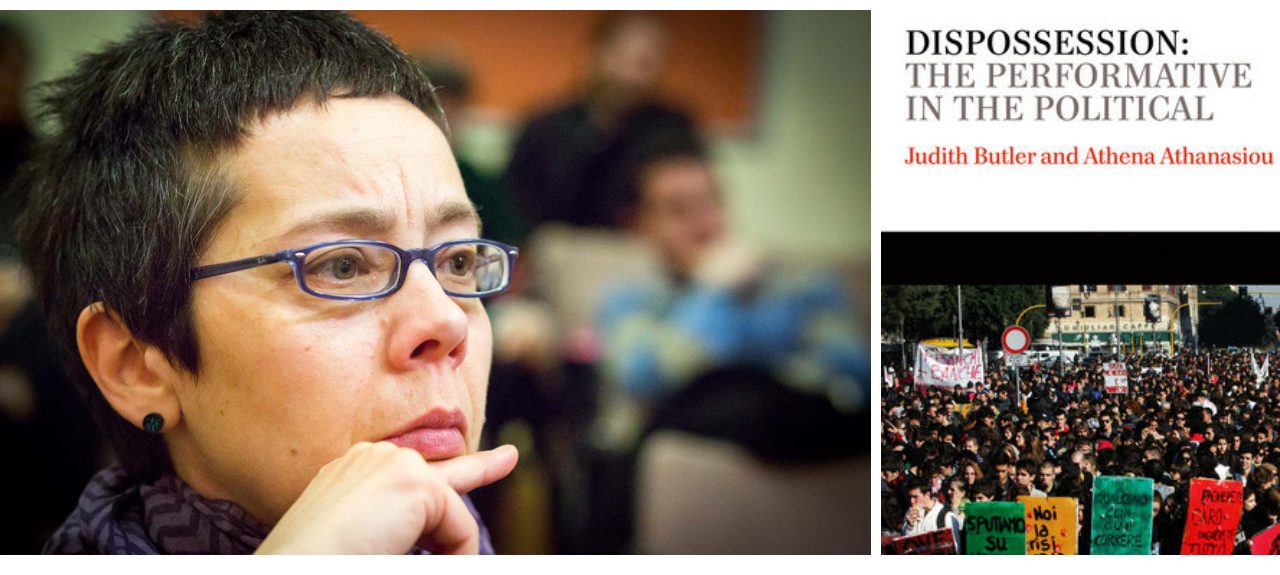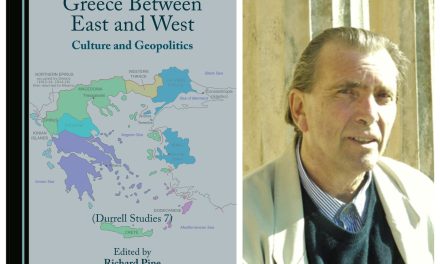Athena Athanasiou is Associate Professor of Social Anthropology at Panteion University of Social and Political Sciences. She has authored the books: Life at the Limit: Essays on Gender, Body and Biopolitics (Athens, 2007); Crisis as a State of Exception: Critiques and Resistances (Athens, 2012); and she has co-authored, with Judith Butler, Dispossession: The Performative in the Political (Polity Press, 2013). She has also edited: Feminist Theory and Cultural Critique (Athens, 2006); Rewriting Difference: Luce Irigaray and ‘the Greeks’ (co-ed. with Elena Tzelepis, SUNY Press, 2010); and Biosocialities (Athens, 2011).
She is a fellow at the Center for the Study of Social Difference, at Columbia University, Vice President of the Athens-based Nicos Poulantzas Institute, and member of the National Commission of Human Rights, Greece.
Athena Athanasiou spoke to Rethinking Greece* about social struggles in Greece and internationally, critical resistance, progressive reforms and the need for a European re-assemblage:
You co-authored with Judith Butler “Dispossession: The Performative in the Political”. Can you tell us more about the book’s content and perspective?
We tried to reflect together on how dispossession –as a power configuration of neoliberal capitalism, colonialism and neo-colonialism, apartheid, nationalism and racism– calls for a critical re-engagement with, and re-imagining of, the political, especially in times of crisis. So, we ask: how does the crisis work to reproduce, complicate, alter and/or intensify the terms through which subjects become gendered, racialized, and classed? And how might this question be asked from the perspective of a resistant performative politics of reclaiming public spaces and liveable lives?
Exploring the concept of dispossession outside the logic of possession, we tried in our conversation to conceptualize its links to relationality, precarity, biopolitics and collective protest. In dealing with the question of what makes political responsiveness possible in these precarious times, we focused on the double valence of dispossession –as the violence of disposability, but also as integral to processes by which subjects are formed in loss and in relation to one another. As it marks the limits of one’s own self-sufficiency, it becomes an occasion for the collective political work of transformation. So we took up current predicaments as an occasion to explore what it means to think about the subject as one of induced precarity, but also as one of “being-with”. In these times of crisis, when certain groups are rendered disposable and exposed to the biopolitical economisation of life, racism, state abandonment and the decimation of public spaces and services, we tried to reflect on how “we” (with all the trepidations and impossibilities that mark this “we”), engage with an agonistic way of reimagining and prompting the political imaginaries of radical democracy today. It is in this sense that in this book we take up the political as performative.
It has been one year since the national elections that brought SYRIZA in power. How do you evaluate this year’s achievements (if any)?
Syriza became the first left government in the European Union. This event presented a great threat to the rule of conservative authorities and unelected functionaries of EU. Syriza’s coming to power opened the existing balance of power as a site of political contest and a horizon of possibility for introducing dissent and the claim for social justice in the EU orthodoxy. Its aim was, and still is, to call for another democratic configuration of politics in Europe. Needless to say, however, this is hardly a finalized achievement. Rather, it is about an unstable and contingent process, without predetermined end. Twenty-five years after the notorious “end of history”, the compulsory economization of the political terrain aspires to take the place of a new «grand narrative» affirming the axiomatic inevitability of global capitalism.
Since the night of July 12-13, 2015, when massive pressure was exerted over the Greek authorities to compel the country out of the Eurozone or agree on a punitive austerity package (a forced «agreement» that the left government could not accept but also could not refuse under those circumstances without certain grave risks), the European Union is a different place: one marked by the surrender of liberal democracy to authoritarianism. In this context, Syriza chose not to leave the battlefield. Appreciating the political significance of such choice requires breaking through both celebration of resistance as invulnerable and deploration of injury as depleted of agency.We need to remember that resistance is, in many ways, always already dependent on power. One of Marx’s most compelling insights is that “Men make their own history, but they do not make it as they please; they do not make it under self-selected circumstances, but under circumstances existing already, given and transmitted from the past.” (The Eighteenth Brumaire of Louis Bonaparte, 1852).
As we are reflecting and struggling to process today the devastating defeat that the left government in Greece suffered in the hands of global finance capitalism, we have yet to make way for acknowledging that it was despite, and even through, that «defeat» that the debt question was politicized, the normativity of the EU as an extra-political, post-democratic project was put in question, and an increasingly divided Europe’s (dis)order of things was pushed to its own limits.
It seems that the crisis as a “state of exception” is becoming the rule throughout Europe, while some of the parties that participated in the indignant movements of 2011 have been integrated into the political system (Podemos, SYRIZA). Do you think the emancipatory potential of those sociopolitical movements is still alive?
The state of unending crisis is a way to regulate what forms of the political are made permissible and possible. Breaking the vicious circle of intensified conservatism, currently manifesting in austerity obsession and securitarian border closures, requires questioning crisis as an apparatus of power and knowledge. It requires, crucially, another configuration of politics in Europe, based on inclusive, post-territorial citizenship and participatory democracy.
I wouldn’t agree with the statement that “the movements of 2011 have been integrated into the political system”. In Greece, in any case, the state is not controlled by the Left and neither has the Left been integrated by the status quo. Étienne Balibar1 has taught us that governmental power does not amount to taking the power of the state apparatus. Governing this way requires institutional imagination, imaginative institutional critique, critical interventions, collective intellect and reflective action, alternative sensibility and responsiveness. What is needed is an equivocation between two antinomical forces of politics: namely,«insurrectional» and «constitutional» politics, to recall Balibar again .
The new configurations of anti-capitalist political mobilization that we witnessed during the past few years in several settings have inscribed a popular discontent with the status quo in the midst of violent dispossession, disposability, despair, and injustice but also in the midst of neo-Nazi and far-right violence. They have made us wield the possible in the actual, albeit without guarantees and without programmed outcome. As present regimes of governance increasingly and differentially expose people to the injuries of poverty, demoralization, and racism, a performative politics of protest has emerged, one which mobilized the potentiality of transforming such injurious interpellations. I think that the transnational reverberations and translations of these movements and struggles, as they traverse regional and national boundaries, have assumed critical urgency in our times.
At this distressing moment for Europe, critical resistance includes resisting the assumptions that underlie the neoconservative manufacture of consent around the narratives of austerity capitalism, securitarianism, and nationalism. Critical agency then pertains to the question of how subjects, through our plural and differential embodiedness and embeddedness, might contest with others these unjust and injurious terms.
 On the one hand, Europe has been deemed a “positive influence” on Greece, in terms of gender and human rights issues, as some progressive reforms in these areas (i.e. the recent civil partnerships law) have been defended as “encouraged” by the European institutions. On the other hand, the European institutions also demand austerity measures and tighter control on borders and refugees. How do you judge this contradictory influence of Europe on Greece?
On the one hand, Europe has been deemed a “positive influence” on Greece, in terms of gender and human rights issues, as some progressive reforms in these areas (i.e. the recent civil partnerships law) have been defended as “encouraged” by the European institutions. On the other hand, the European institutions also demand austerity measures and tighter control on borders and refugees. How do you judge this contradictory influence of Europe on Greece?Let me reply to your question with two points and self-positionings, in a nutshell: First, I don’t subscribe to the uncritical Eurocentric conception of white bourgeois Europe as the enlightened cradle of human rights. And second, I defend and affirm gender equality and genderqueer politics that are not associated with the production of new devastating injustices and violences, such as anti-immigration nationalism.
It is clear to me that human rights in Europe are today, and have been in the past, put at risk. There are EU governments that set aside human rights in the name of sanctified “security”, in contexts of combating terrorism. Anti-immigrant and anti-refugee sentiments and violence, as well as abusive asylum procedures and detention conditions, are widespread across the continent. In “fortress Europe”, which witnesses the callousness of closed borders and a neo-Nazi upsurge, the cynical politics that produces superfluous and desperate people is intricately related to fascism, racism, and the extreme nationalist definition of homogeneous and exclusive community -with all its fundamental implications of capital, gender, sexuality, and ethnicity.
So I think it is important to reply to the question: what alternative and critical form of non-eurocentric, non-alienating «Europe» and its infrastructural conditions would be embodied by refugees and undocumented migrants who cross the Mediterranean waterways in leaky and overcrowded fishing boats hoping to reach European shores and being let die in the attempt? What claims to the institutional conditions for livability do they enact, every time they encounter barricades, racist attacks, and military institutions of securitization instead of conditions that allow for safe crossing, welcoming, and equal belonging?
I am convinced that there is an urgent need for a process of restructuring and re-founding of Europe and in Europe, beyond territory. A Europe committed to, and ruled by, the neoliberal agenda and its concomitant destitution, inequalities and discriminations should give its place to a social and political Europe of rights, participatory democracy, and inclusive citizenship.
Can we still re-think Greece as a country of progressive reforms within the current economic, social, and political constraints?
Under harsh pressure, Syriza government has passed laws that bear clear democratic left valence. Its record of progressive reforms includes a law that provided relief from humanitarian crisis by offering free food, electricity and public health access to those who have been mostly affected by the austerity policies; the citizenship law which granted nationality to all second-generation immigrants and first-generation immigrant children who had five years of schooling in Greece; the law designed to democratize penal law and to ensure the humane treatment of those incarcerated in the country’s prison system; the law on civil partnership with no gender and sexuality exceptions, and many others.
At the same time, short of adequate local infrastructures and EU support, and also despite and against border closures mandated by other European states, the Greek government seeks to undertake efforts that could respond to, and counter, the intensifying anti-refugee policies in Europe. Again, this is not (only) about Greece. Europe is at the edge of a collective disaster: an appalling mix of rapidly rising nationalisms, disintegrating democracy, heightened autarchic governmentality, and deepening economic inequalities.
The question is how to derive transformative potential from constraints; how to provoke shifts in the terms through which the political is articulated in Europe today. Whether, how, and at what cost Syriza can hold on and promote egalitarian policy under the tutelage of the austerity memorandum, is to be seen. This, of course, relates to a broader question: is it possible to go beyond the normative horizon of capitalist globalization within a nation-state in light of present conditions of impossibility – capitalist crisis, securitization, rising nationalisms, and the post-colony? This would arguably require building transnational alliances and coordinating social struggles and movements. It would require more courageous solidarity and more consistent mobilization among the peoples of Europe. In order to turn the tide across the continent, we urgently need a European re-assemblage. Not an easy task.
1.Étienne Balibar, «The ‘impossible’ community of the citizens: Past and present problems», Environment and Planning D: Society and Space, 30 (3): 437-49, 2012
*Interview by Ioulia Livaditi
Read more: Dispossession: The Performative in the Political – Amazon.co.uk: Look inside the Book; The performative dialectics of defeat: Europe and the European left after July 13, 2015; Cody Campbell: Book Review: Dispossession: The Performative in the Political; Athena Athanasiou: Becoming precarious through regimes of gender, capital, and nation;
Watch Athena Athanasiou’s lecture: “As if it were possible”: Performing the Institution in the un/common space of the Polis” (3rd International conference of the Group for Social Engagement Studies, University of Rijeka, How to Act together: From Collective Engagement to Protest, Belgrade, November 19-21, 2015):
TAGS: CRISIS














